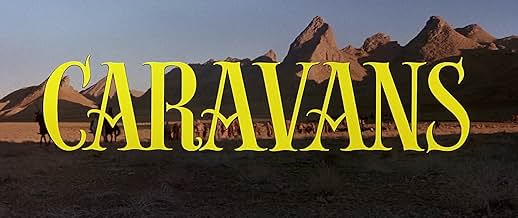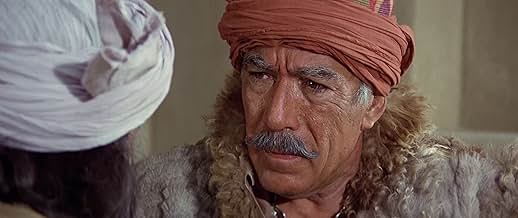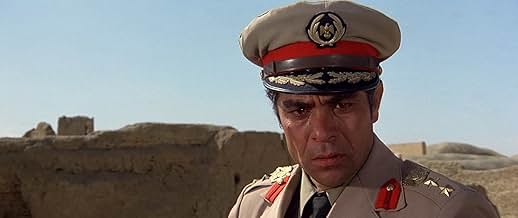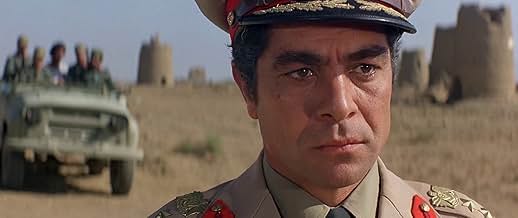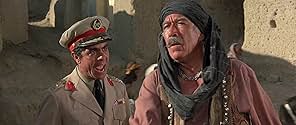IMDb RATING
5.9/10
1.2K
YOUR RATING
In 1948, at the U.S. embassy in Zadestan, a young diplomat is ordered to find the missing daughter of an influential U.S. Senator.In 1948, at the U.S. embassy in Zadestan, a young diplomat is ordered to find the missing daughter of an influential U.S. Senator.In 1948, at the U.S. embassy in Zadestan, a young diplomat is ordered to find the missing daughter of an influential U.S. Senator.
- Nominated for 1 Oscar
- 1 nomination total
Behrouz Gramian
- Peasant Boy
- (as Behrooz Gueramian)
Mohammad Taghi Kahnemoui
- Maftoon
- (as Mohammad Taghi Kahnemout)
Featured reviews
The movie, Caravans, was filmed in Isfahan, Iran, and near by the city out in the desert. I had the opportunity to visit the sets on several occasions. Some of the film was shot at what was then called the Shah Abbas Hotel, the best hotel in town and one which used to be a Caravanseri. It was and still is a beautiful hotel, with much blue and white tile walls and brass chaise lamps. Across from its landscaped Persian garden courtyard is an alcove where one of the scenes of the movie was filmed. It was a tight fit, with many cameras and crew packed into its small space. They did a number of takes that day. Most of the cast stayed at this hotel. Rumors claimed Anthony Quinn didn't like his mattress and threw it out his window. My Time Magazine mentioned that Jennifer O'Neill complained about the lack of dry cleaners. I found these stories amusing. I also got invited to a desert filming near Isfahan and I had a wonderful day on the set. That day, they were shooting the caravan going by as well as Jennifer O'Neill in a tent with some other women. I was able to get some photographs of some of the actors, but when I asked Anthony Quinn if I could take his picture, he asked me not to since he wasn't wearing makeup. There was a good bit of time to kill between filming, and near sunset, some of the Iranian extras started doing a spontaneous mock dance fight using sticks. I heard group singing from Jennifer O'Neill's tent. It was a magical day, one I will never forget. I didn't have the chance to see Caravans until years later. Unfortunately, the movie itself isn't nearly as exciting as watching it get filmed.
US Embassy official "Miller" (Michael Sarazin) is despatched into the desert to try to track down the missing daughter of an influential US Senator. After many days (and it does feel like it) he meets her new and proud local husband - "Col. Nazrullah" (Behrouz Vossoughi) who initially refuses to let him meet her, only for it to turn out that she has again gone missing. More travelling reveals she has taken up with "Zulfiqqar" (Anthony Quinn), a tribal leader who makes a bit of money on the side smuggling Russian rifles into India. What now ensues is a remarkably filmed but terribly plodding adventure story that sees him and "Ellen" (Jennifer O'Neill) begin to understand each other and for him to realise just what she loves about her new home and it's people. Mike Batt's score (featuring the lovely dulcets of Barbara Dickson) and some beautiful and historic cinematography in and around Iran adds loads of richness to this presentation of the story, but sadly Quinn arrives far too late in the day to rescue this from grand-scale mediocrity and it ends rather weakly and ponderously. It could easily have been thirty minutes shorter and perhaps that would have tightened it up enough to sustain the thinly padded out thread, but as it is, it's a long old slog!
This is a rare look into the Islamic world just before the Iranian revolution, that virtually cut-off all communication with Western cultures. International intrigue, and the complexities of "cold-war" politics are just below the horizon in this all too "Ugly American" tale of the last caravan.
The tribal scenes are unequaled in their energy and authenticity. The inclusion of local clans and their customs bring forth a realism unique to modern films. Unfortunately, this cannot be said of the screen play, which is shallow and reflects western values at their worst. Acting is staged at best. No attempt at character development, much less motivation.
Spectacular filming of Iranian ruins. Biblical visions, for those with open minds,are stunning. We can only hope for a deeper glimpse.
The tribal scenes are unequaled in their energy and authenticity. The inclusion of local clans and their customs bring forth a realism unique to modern films. Unfortunately, this cannot be said of the screen play, which is shallow and reflects western values at their worst. Acting is staged at best. No attempt at character development, much less motivation.
Spectacular filming of Iranian ruins. Biblical visions, for those with open minds,are stunning. We can only hope for a deeper glimpse.
I had the exceptional opportunity to be one of two Americans in-country to witness the filming of Caravans. It was filmed outside Isfahan, Iran and I was then the American Vice-Consul in Isfahan (read: second banana, of two). Our Consul, my lovable, affable boss, was David McGaffey and he and our wives enjoyed several opportunities to visit the set and to dine with the cast. The real setting of the story, I believe, was in Afghanistan. My tiny claim to fame is that my desk was the one used by Joseph Cotton, who played the American Ambassador. I had inherited the ambassadorial-size desk as a result of the closing of a consulate in Khoramshar many years earlier -- it filled my tiny office such that I had to squeeze to get by and sit at it. The crew borrowed several other props from our consulate, including, most notably, our official metal seal, which they masked over to say Embassy instead of Consulate, as best I recall.
The actors were superb, as was the costuming. It is hard to imagine, for example, that only one or two actors had "real" guns and the rest of the army had cleverly-painted sticks. Alas, the direction sank the movie, to my everlasting disappointment. Caravans is a great Michener read, but the movie died and my "6" is, I think, charitable and a salute to the fine folks who graced Isfahan with their presence back then, for several fun-filled weeks.
The actors were superb, as was the costuming. It is hard to imagine, for example, that only one or two actors had "real" guns and the rest of the army had cleverly-painted sticks. Alas, the direction sank the movie, to my everlasting disappointment. Caravans is a great Michener read, but the movie died and my "6" is, I think, charitable and a salute to the fine folks who graced Isfahan with their presence back then, for several fun-filled weeks.
This certainly isn't a great film, but it is entertaining, and even more so since it takes place in Iran. Most, if not all movies that take place in the Middle Eastern are set in Arabic countries. So much so that even in this day in age most people in the West associate the Mid-East solely with the Arabs.
But this movie is unique in that it not only takes place in Iran, a non-Arab country, but it was also filmed there as well, right before the Revolution, which technically began in '78 but was firmly established the year later.
The turmoil of the Revolution took place in the major urban centers, which this movie was filmed far away from, in the desert areas of the province of Baluchistan, which borders Pakistan. The Baluch are an Iranian people, related to the Persians, Kurds, Azari's, etc. with their own distinct culture and heritage.
What really makes this film interesting is that they portray the Baluch and their dress and customs fairly accurately. It's obvious the filmmakers did their homework and actually put some effort in learning about the various Iranian ethnic groups and the differences between them. For example, the Baluch have had plenty of conflicts with the central government for quite some time, and this fact is made good use of in the movie. Even today the Baluch create problems for the central government every now and then, what with all the smuggling going on, which is their primary trade.
All in all, if you're looking for something unique, give this movie a shot. Don't expect too much in the way of story or acting, but you're sure to find the scenery and the exposure to a different culture interesting.
As a sidenote, it's interesting (but not surprising given Western ignorance) the two other reviewers were under the vastly mistaken impression that the movie was concerned with an Arabic or "bedouin" tribe, since there are no such tribes in Iran and also despite the fact that the film quite emphatically makes it clear that the tribe is Baluchi. You'd think people would realize that Iran is not an Arab country by now.
But this movie is unique in that it not only takes place in Iran, a non-Arab country, but it was also filmed there as well, right before the Revolution, which technically began in '78 but was firmly established the year later.
The turmoil of the Revolution took place in the major urban centers, which this movie was filmed far away from, in the desert areas of the province of Baluchistan, which borders Pakistan. The Baluch are an Iranian people, related to the Persians, Kurds, Azari's, etc. with their own distinct culture and heritage.
What really makes this film interesting is that they portray the Baluch and their dress and customs fairly accurately. It's obvious the filmmakers did their homework and actually put some effort in learning about the various Iranian ethnic groups and the differences between them. For example, the Baluch have had plenty of conflicts with the central government for quite some time, and this fact is made good use of in the movie. Even today the Baluch create problems for the central government every now and then, what with all the smuggling going on, which is their primary trade.
All in all, if you're looking for something unique, give this movie a shot. Don't expect too much in the way of story or acting, but you're sure to find the scenery and the exposure to a different culture interesting.
As a sidenote, it's interesting (but not surprising given Western ignorance) the two other reviewers were under the vastly mistaken impression that the movie was concerned with an Arabic or "bedouin" tribe, since there are no such tribes in Iran and also despite the fact that the film quite emphatically makes it clear that the tribe is Baluchi. You'd think people would realize that Iran is not an Arab country by now.
Did you know
- TriviaSir Christopher Lee has said in interviews that most of his role hit the cutting room floor.
- Alternate versionsABC edited 27 minutes from this film for its 1982 network television premiere.
- How long is Caravans?Powered by Alexa
Details
- Release date
- Countries of origin
- Official site
- Languages
- Also known as
- Der Herr der Karawane
- Filming locations
- Production companies
- See more company credits at IMDbPro
Box office
- Budget
- $14,000,000 (estimated)
- Gross US & Canada
- $3,930,501
- Gross worldwide
- $3,930,501
- Runtime
- 2h 7m(127 min)
- Sound mix
- Aspect ratio
- 2.35 : 1
Contribute to this page
Suggest an edit or add missing content

